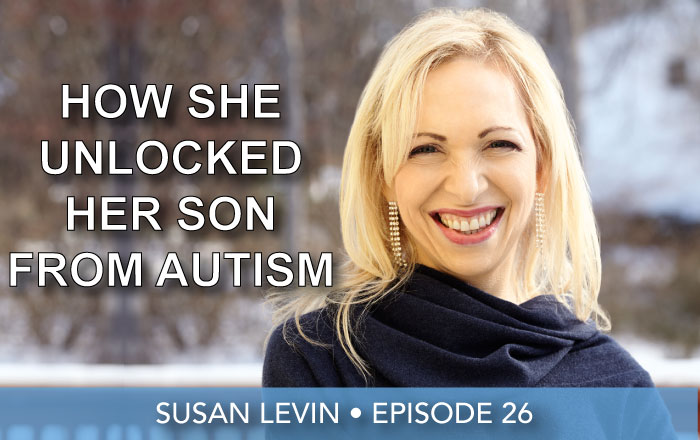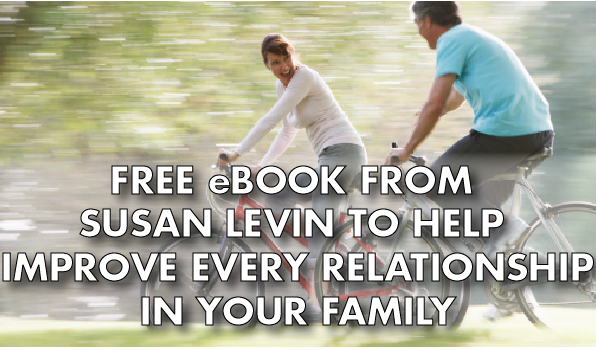Episode 26 | Susan Levin | Unlocking Her Son From Autism

CLICK PLAY!
Why you should listen
We have an amazing guest today…she’s devoted her life unlocking and unleashing her best self. I know I say that every week, but it is true. And this week, it’s particularly true. Today’s guest is Susan Levin, and she has an incredible story which she’s revealed in her book, Unlocked.
Her son, Ben, was diagnosed with autism at nearly 5 years of age. She hit an emotional low, like she’d never known before. Susan is a strong person…she graduated from Harvard, and she was a lawyer in Boston. But when shocked with this news, she felt desperate, and terribly overwhelmed.
And that’s when her journey began…to understand the roots of her son’s autism, and discover methods to improve his condition. Along the way, a transformation took place in her life, and the lives of everybody in her family. And it was a POWERFUL transformation!
FAMILIAR WITH PODCASTS? LISTEN ON iTUNES!
Follow Along With The Highlights
Not knowing what’s going on with your child’s health is simply terrifying. After you received the autism diagnosis from Ben’s doctor, I imagine that it might have been a relief to know what was going on – now you could try to prepare to solve this problem. Is that how you approached the situation or am I being overly simplistic?
After I received the diagnosis, I had a nervous breakdown for about three months. I was absolutely devastated. It stemmed from this vision I had about what my family life was going to be – I knew how many kids I wanted, where I wanted to live, what kind of vacations we would take – stuff like that.
When I started seeing signs that Ben was different, I didn’t quite take it in that that this could be autism because it wasn’t really in the media the way it is now. But, when he was diagnosed he got this label – autistic. And, in that one moment, it felt like every dream I ever had about this family life was obliterated. It was like I was seeing the vision of my future die. But, the remarkable thing about this whole journey is that it helped me realize that my love for my children was kind of selfish. It wasn’t about my children, rather my “love” was about the family that I wanted and the children that I had envisioned.
Your book is fantastic and I’m particularly drawn to the parts where you talk about unconditional love, judgement, acceptance, and your journey through them. It’s easy to be “non-judgmental” until you find yourself in a specific situation and you find out just how wrong you are! So, I found your journey and how this experience has transformed your life to be truly profound.
As you know, I’m big into eating healthy, so let’s dive into a healthy diet for a child with autism. How can that diet influence their behavior?
One of the biggest culprits with children on the autism spectrum is yeast. Children with autism can have too much yeast and that’s not ideal because yeast can eat away at our microthin gut lining. That lining is important because it contains most of the serotonin and dopamine that we produce. These are the “happy juices” that we produce when we’re having emotional reactions to thing. Also, 70% of our immune system is housed in the gut lining. Once this starts to break down, toxins can get into our bloodstream and impact the brain’s functioning.
There are certain foods that contribute to the production of yeast. Yeast loves junk food and all of that processed stuff. The problem is that these processed foods are actually addictive because they release endorphins in the brain after you eat them. So you have vicious cycle of addictive food that yeast simply loves which then eats away at our gut lining. I was so fascinated by all of this that I actually became a certified nutrition consultant.
An autism diagnosis really does have a profound impact on the entire family. For example, Moms with kids on the spectrum are dealing with a tremendous amount of stress and so a lot of us eat really bad food because of that little endorphin kick we get. But, as we know, it’s just a temporary rush and we have to learn how to be strategic with the foods we choose because it’s important for the parents to heal also.
The industry standards for where family can start is to remove gluten and casein (a protein found in most dairy). Gluten can take months to get out of the system, so don’t get discouraged if it takes awhile.
A lot of times the caregiver in any situation is overlooked – the person receiving treatment gets the attention. The caregiver does the work and goes through the heartache without receiving a lot of care. Tell me how you figured that out for yourself and what steps you took to make sure that you were taken care of.
I have a program called the Autism Moms Self-Care Workshop because I think it’s incredibly important that moms be seen as someone with special needs because, as you point out, every caregiver you know usually puts themselves at the bottom of the list. So then the caregiver gets sick and they’re not available to be helpful. So, an essential part of my self-care system is having a time every morning that’s just for me. In order to have that time, I have to get up very early. My middle schoolers already get up fairly early, but I have to get up earlier than they do because I need to have a part of my day just for me – before all of my life’s responsibilities come crashing down on me. This is time to invest in myself. I have a meditation and yoga practice every single day – no matter what. I try to take care of my body, mind, and spirit before my day begins. And this practice allows me to meet my day with a different version of myself. I’m much more peaceful.
I also use essential oils like lavender, frankincense, and peppermint for clarity – you just have to find what works for you. And that focus on “what works for you” is a big paradigm shift as well. I have to be there for my family, but it’s sort of like putting the oxygen mask on yourself first. Once you can breathe peacefully, then you can be more comfortable and bring a lot more to the table.
In your book, you beautifully write about creating a bridge to your son, Ben. Can you talk about how you created that bridge?
We did something called the Son-Rise Program which is an at-home child-driven therapy. The parents are trained at the Autism Treatment Center of America in Massachusetts. Essentially, you create a distraction-free environment where there’s only one other person in the room with the child. This means that the relationship with that other person is the most exciting thing in the world once you’re in that room. Your job as the other person isn’t to try and change them; it’s to just love them and be with them and accept them for who they are. Ben would do a lot of repetitive behaviors like drawing these incredible mazes or ripping up paper for hours. So, I would go in and just join him and do whatever he did – not for their attention, but just to experience what they experience. It’s a statement of “I love you and I just want you to do what you’re doing. I don’t need anything from you.”
This was very difficult for me because I judged Ben’s autism terribly. I also judged myself for judging my child. But, the miracle of Son-Rise is that the only thing you have to be great at is really loving your child – and I wound that I was really good at that. I would get into that playroom with him and I would rip that paper. Over months, he started to really see that I was in there with him. He was six-years old when it first happened. I got so excited that I leapt up and thanked him for looking at me. Ben immediately sat down and didn’t look at me again for the rest of the day. But, we kept at it and, slowly, we started to build this connection. We did the Son-Rise Program full-time (25-50 hours a week) for almost three and a half years and then we did a part-time program. He’s a transformed kid.
You’ve been kind enough to give listeners of On Health a free booklet. How do they find that?
Go to www.unlockyourchild.com/Kathy. The booklet just talks about the ways in which the entire family in impacted by autism – spouse, siblings, grandparents. It provides people with some principles to handle the tough situations that can pop up over time.


